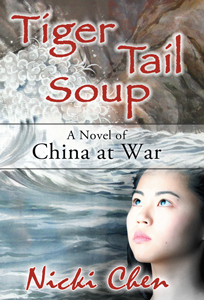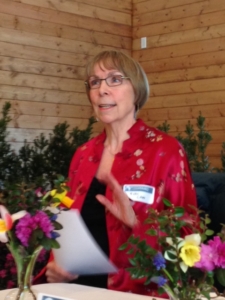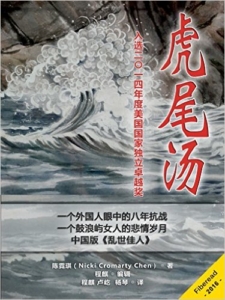Nicki Chen is the author of Tiger Tail Soup, a historical novel that tells the story of a Chinese woman struggling to survive during the Japanese invasion. The novel is set on Kulangsu (Gulangyu), a small island near the city of Xiamen.
Why did you set Tiger Tail Soup on Kulangsu Island?
The stories my late husband told about his childhood on Kulangsu Island were the inspiration for my novel. It was a place that was alive in my imagination long before I thought of writing Tiger Tail Soup.
What background reading did you do to get the period detail correct?
When you walk into an American bookstore, you’ll find shelf after shelf of books on the European and Pacific theaters of World War II and almost nothing about China during that same war. I did find and buy a handful of good books, e.g. China’s Bitter Victory by James .C. Hsiung & Steven I. Levine and Passivity, Resistance, and Collaboration by Poshek Fu.
Uncovering all the small details that go into making a historical novel realistic was a real challenge. Fortunately, the University of Washington has a large Asian collection, so I spent days combing through their shelves, taking notes, and making photocopies. I also read novels by Eileen Chang and Han Suyin and books on everything from Chinese opera to Chinese nursery rhymes to the I Ching. I found a few things online, but during the time I was writing the novel there wasn’t much in English about that small corner of China.
Have you been to the locations described in the novel?
In 1983, my husband, our three daughters, and I spent a week in Xiamen (Amoy) and Gulangyu (Kulangsu). China was just beginning to break down the Bamboo Curtain and allow foreigners to visit. We were among the first wave in that part of China. When we arrived, Xiamen was putting the finishing touches on their new hotel for Overseas Chinese. We had reservations, but when they saw that I wasn’t Chinese, they didn’t want to let me and our daughters stay there. Since there were no hotels in Xiamen for foreigners, we would have been out of luck if my husband hadn’t, after a long argument, finally won them over. He convinced the manager with what he said was an old Chinese saying: Marry a chicken, follow a chicken; marry a dog, follow a dog.
Visiting Kulangsu in the early eighties was a stroke of luck for me. Since not much had changed since the 1940s, I could picture the islands as they would have been at the time of my novel.
What does the title refer to?
Tiger Tail Soup refers to an episode in the novel when the family was suffering from a lack of food, especially meat. After a couple of tigers were shot, the family’s maid lined up to buy a chunk of the tiger’s tail, which she then made into a soup. To me, that soup symbolized their will to survive.
My husband told me that story when we were still dating. His stories lent him an exotic air and added to his appeal. I didn’t learn until after my novel was published that there were thousands of tigers in Fujian Province in those days. In fact, the Amoy tiger (South China tiger) is thought to be the ancestor of all tigers.
Tiger Tail Soup is dedicated to your late husband, Eugene Yu-Wei Chen. How did you meet?
I tell the story of how we met in more detail in two blog posts: How I Met My Chinese Husband, Part 1, and How I Met My Husband, Part 2.
It started out with a prediction from Eugene’s mother. He had the habit of holding his chopsticks at the far (thick) ends, which she said, was a sure sign that he was destined to marry someone from far away. When the Nationalists lost the Chinese Civil War to the Communists, Eugene’s family was forced to flee to Taiwan. Later, in Yokohama, he attended an international boys school where the language of instruction was English (preparing him to be able to speak to his future wife).
He started studying Engineering at the University of the Philippines, but the heat and lack of air conditioning resulted in “jungle rot,” so he transferred to Seattle University. After graduation, he had a job lined up with Boeing, but it fell through when Boeing lost a big contract. He ended up in an unlikely place, my home town, Sedro-Woolley, WA, with a job as an engineer at Skagit Corporation. The parish priest introduced us, we started dating, and after a few twists and turns we got married.
Congratulations on having Tiger Tail Soup published in Chinese. It’s quite a compliment to have a publisher spend time and money on translating a work. Apart from your novel being a good story, what do you think was the appeal—the “foreign” nature of the setting as an old treaty port?
I can only guess what the appeal might have been. Two things might have been of interest. First, the current interest in the Japanese War (the Second Sino-Japanese War). It’s probably easier to remember being invaded than to think about homegrown problems like The Great Leap Forward and the Cultural Revolution.
Second, the tourist appeal of Gulangyu (Kulangsu). China’s youthful population may not be familiar with the history of the treaty ports, but they are familiar with the traffic and air pollution of China’s cities. Since Gulangyu doesn’t allow cars, the island is clean and quiet. The beautiful old foreign-inspired houses are another draw.
How did the translation process work?
The Beijing translating/publishing company, Fiberead, hires freelance translators. For my novel, thirty eight translators applied; three were chosen. One of them was also the editor. They communicated with me through the Fiberead online site to be sure they understood my meaning and intent. Each of them translated different chapters. When they’d finished, they went back and proofread all the chapters. So everything was gone through four times.
When did you catch the writing bug?
Maybe it started with the bedtime stories about giants and flying carpets my dad invented for me when he returned from World War II. Or maybe with all the reading I did when I was a child. For many years, though, my art form of choice was drawing and painting. My profession was teaching.
After our three daughters were born, my husband accepted a job with the Asian Development Bank in Manila, and I became what they now call a “trailing spouse.” Lacking a work permit, I kept busy with volunteer activities and classes. My favorite class was Chinese brush painting. I became good enough at it in fact that I considered writing and illustrating children’s books. I signed up for a correspondence course in writing children’s literature, and when I finished that course, I applied to Vermont College of Fine Arts for a MFA in Creative Writing.
There’s nothing magical about my story. I think that when you put effort into anything, you learn to love it.
Do you think book clubs and writing groups are useful for writers?
I don’t belong to a book club, but I enjoy visiting them to talk about my book. I do belong to a writers’ group. We meet every two weeks to read and critique what we’ve been working on. Writing is a solitary activity, so for me, it’s invaluable to exchange ideas and opinions with a group of trusted friends.
Given the success of your first novel, why did you decide to set your new one in a different region? With a novel in East Asia you would have a built-in audience and you could have utilized the many contacts you’ve built up.
I wanted to write something about expatriates. Living abroad for any length of time is a fascinating experience that varies greatly by country, person, and time period. The novel I’m working on now actually starts in Manila during the coup attempts that followed the People Power Revolution. From there it moves on to Vanuatu. I hope the contacts I’ve built up will also be interested in a story about expats.
Nicki Chen’s blog: Behind the Story
Robert Barge’s review of Tiger Tail Soup.
To purchase Tiger Tail Soup.



